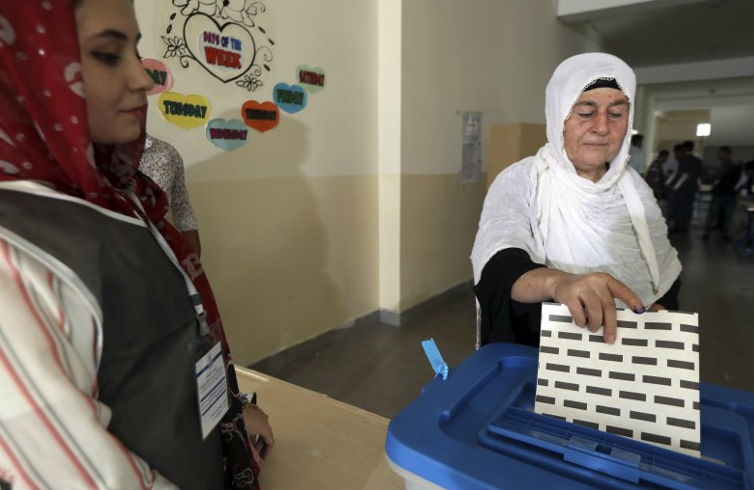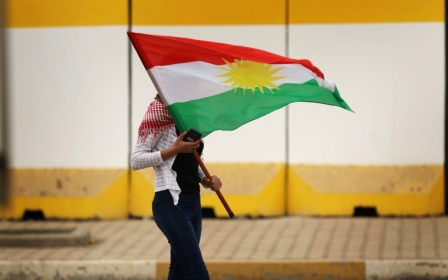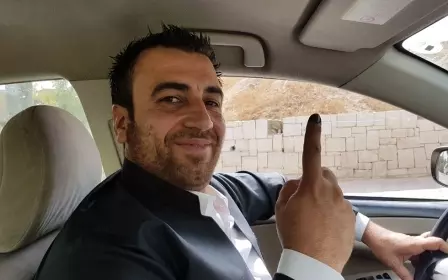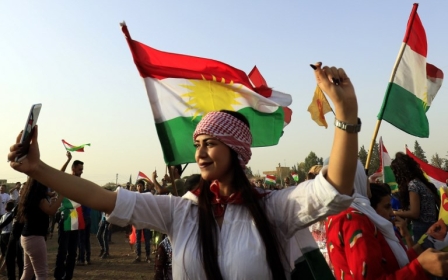Polls close in election for new parliament in Iraq's Kurdish region

Kurds have voted in a parliamentary election in their semi-autonomous region in northern Iraq, with the two traditionally dominant parties widely expected to extend their power-sharing rule despite growing discontent and a low turnout.
Sunday's poll came a year after the region of six million made a failed bid to break away from the rest of Iraq in a campaign headed by Masoud Barzani, leader of the Kurdistan Democratic Party (KDP).
Barzani has retained a support base even though his independence drive was crushed by the Baghdad government, and splits within the Patriotic Union of Kurdistan (PUK) mean the KDP could gain the upper hand in their two-party ruling coalition.
Polls closed at 6pm (15:00 GMT), with preliminary results expected within 72 hours.
The leading parties said they did not expect more than about 40 percent of registered voters to take part.
At midday, the Independent High Elections and Referendum Commission had said turnout ranged between 16 to 23 percent in a breakdown of provinces, the Reuters news agency reported.
A weak opposition has been unable to challenge the KDP-PUK alliance. Both parties have dominated Kurdish politics for decades.
"I don’t know who I will vote for but our family has always supported the KDP. My son will pick a candidate for me," said Halima Ahmed, 65, as she walked with a cane in the city of Erbil, the seat of the Kurdistan Regional Government (KRG).
More than three million voters had been eligible to cast ballots across three provinces in the northern region, where 673 candidates from 29 political movements were vying for seats in the 111-member parliament.
Eleven of the seats were however reserved for religious and ethnic minorities: five for Turkmen candidates, five for Christians and one for the Armenian community.
The oil-producing region's unsuccessful independence bid, stagnant politics, unpaid public sector salaries and corruption have undermined the population's faith in politics and turnout shrank in recent elections.
'A new chapter'
Iraq's Kurds have been a key US partner in the war against the Islamic State (IS) and had hoped their role would boost international support for statehood.
A referendum in September 2017 promised to set Iraq's Kurds on a path to a homeland and nearly 93 percent voted in favour of independence, despite pressure from the central government in Baghdad and threats from neighbouring Turkey and Iran.
The future authorities must look after the people, especially the poor
- Soran Rassul, an unemployed man
But the massive "yes" vote, deemed illegal by Iraq's federal government, badly backfired.
Baghdad imposed economic penalties and sent federal troops to push Kurdish forces out of oil fields vital for the region's economy, depriving it of a key lifeline.
This election must "start a new chapter" in relations between Kurdistan and Baghdad, said 26-year-old Hawzar Salar as he cast his ballot in Erbil.
The vote, he said, comes "after the problems caused by the referendum and the war against the Islamic State group."
Kurdistan had enjoyed an economic boom after the 2003 US-led invasion of Iraq that toppled longtime leader Saddam Hussein, as the rest of the country sank into violence.
But the emergence of IS in 2014 coupled with tumbling oil prices battered the region's economy.
Since 2014, Iraqi Kurdistan has borrowed more than $4bn to stay afloat, according to some experts, and before the doomed referendum it had chalked up debt of around $12bn, the AFP news agency reported.
"The future authorities must look after the people, especially the poor," said Soran Rassul, an unemployed man who voted in Sulaimaniyah, Kurdistan's second city and a stronghold of the PUK.
Fraud fears
Kurdish opposition parties did poorly when Iraq held federal elections in May.
But multiple allegations that the KDP and PUK had committed election fraud, not confirmed in a subsequent recount, may sway voters in their favour, Reuters reported.
Gorran, the main opposition movement, has been weakened by infighting and the death of its founder and leader Nechirvan Mustafa last year.
"I wanted to make sure I voted early. I gave my vote to Gorran and hope for the best," said Omar Mahmoud Abdullah, 52, at the polling station set up at Shireen School in Sulaimaniya.
In another polling station in Sulaimaniya, lawyer Hassan Dalloush, 65, also said he was voting for the opposition.
"If there’s no fraud in this election, I'll feel good about it. But the parties in power always want to commit fraud, it's the only way they stay in power," he said.
"I will never vote for the parties in power. Today I voted for the opposition."
Nevertheless, some voters showed optimism about the future. Salar Karim arrived at a polling station with his wife and two young children, all dressed festively for the occasion.
"Today is a historic day for Kurds," Karim, 50, said. “We get to elect our parliament as is our duty. I feel good about today."
New MEE newsletter: Jerusalem Dispatch
Sign up to get the latest insights and analysis on Israel-Palestine, alongside Turkey Unpacked and other MEE newsletters
Middle East Eye delivers independent and unrivalled coverage and analysis of the Middle East, North Africa and beyond. To learn more about republishing this content and the associated fees, please fill out this form. More about MEE can be found here.




